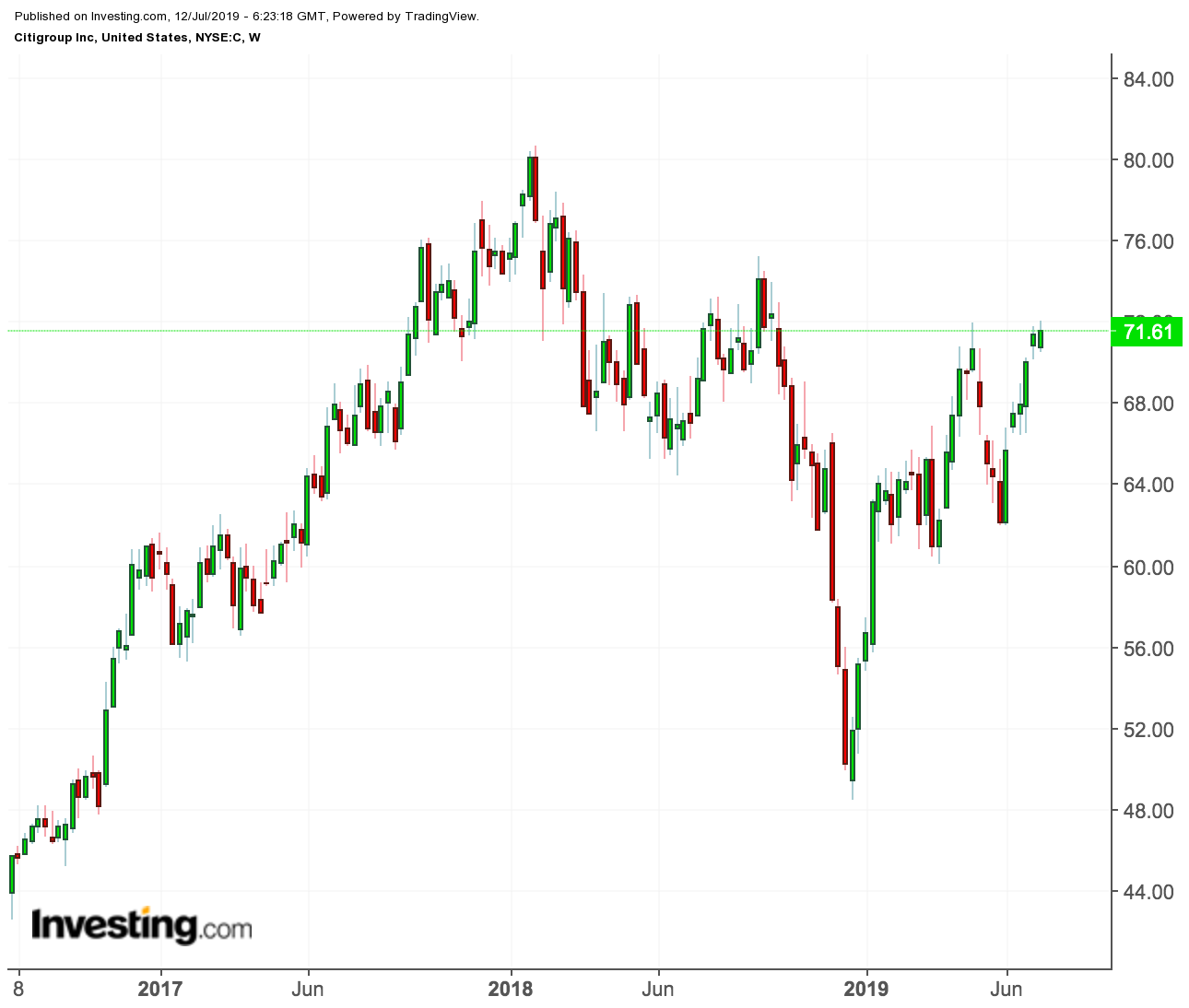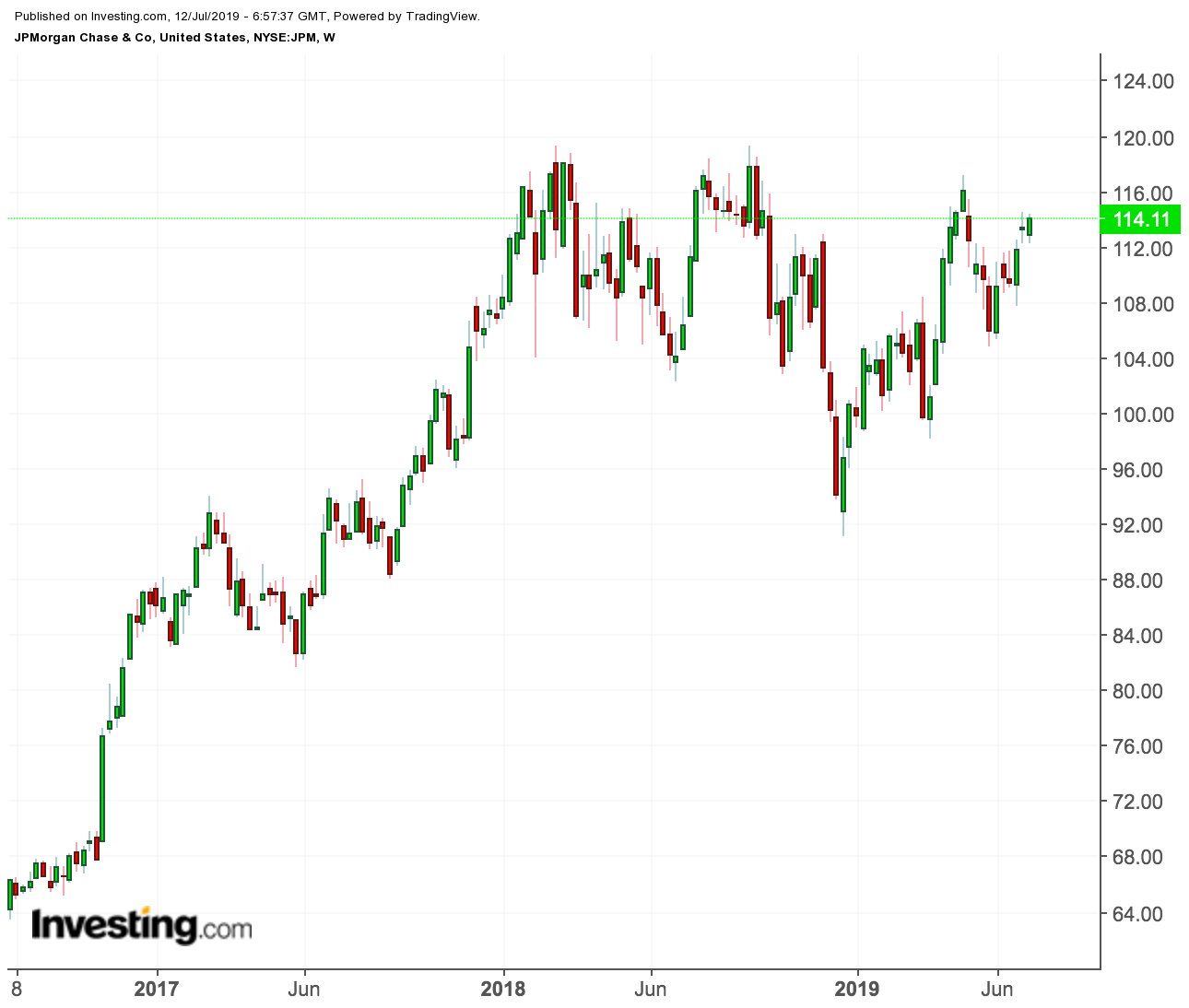With the second-quarter earnings season getting into full swing in the next couple of weeks, the nation’s largest banks are the first to show whether their earnings have been affected by signs of economic weakness, trade war escalation, and the falling interest rates.
Investor sentiment toward banking stocks hasn't been as positive as it has been for other sectors of the market. The Settle KBW Nasdaq Bank is down more than 7% over the past 12 months, compared with an 8% jump in the S&P 500, despite the fact that bank earnings have been generally healthy.
Investors are fearing that the U.S. economy is at the late stage of a bull cycle and may be close to a downturn. That would hit banks in numerous ways, from slower lending to higher defaults.
In the coming week, investors will be looking for trouble spots as the biggest U.S. banks start reporting. In this domain, we’re focusing on the following two big names for possible buying opportunities after their earnings reports next week:
1. Citigroup
If you're looking to reenter this sector, we think Citigroup (NYSE:C) is one of the best banking stocks to own right now. We derive our optimism from the lender’s sustained cost-cutting during the past decade and re-balancing of its portfolio.
These efforts are beginning to pay off and the bank is seeing improvement in both its revenue and profit. After going through a sharp correction in the last quarter of 2018, Citigroup shares are back in the game, rising 38% this year, more than double the gains of the KBW Bank Index that rose 15% in the same period. The stock was up almost 1% on Thursday to close at $71.61.

Citigroup, which reports on Monday, is expected to post $1.85 a share profit on revenue of $18.71 billion according to analysts’ consensus estimate.
One potential risk to banks’ earnings in the past quarter is coming from reduced trading volumes. Citigroup warned in late May that trading revenue had declined in Q2 due to a burgeoning trade war between the U.S. and China, the U.K.’s planned exit from the European Union and escalating tension between the U.S. and Iran.
Even with this weak macro backdrop, Citigroup is one banking stock that could perform better than the others due to the company’s sustained efforts at cutting costs during the past decade. These efforts are reflected in the lender’s rapidly improving efficiency ratio, or expenses as a percentage of revenue. This metric has come in at less than 60% for the past four years, making Citi the only major bank able to maintain such a winning streak.
2. JPMorgan Chase & Co.
Wall Street’s powerhouse commercial and investment bank, JPMorgan Chase & Co. (NYSE:JPM) is another stock to watch closely when it releases its Q2 earnings on Tuesday. Analysts on average expect $2.53 a share profit on sales of $29.02 billion.
Driven by strong loan growth and robust business in the lender’s flagship investment banking division, 2018 proved a great year for JPMorgan. The bank posted record net income—even when you take out the benefits from U.S. tax reforms.
The story was also quite encouraging in the first-quarter, specifically the crucial net interest income figure, which measures the spread between revenue from customers’ loan payments and what it pays depositors. The income from that division jumped to a record $14.5 billion in the first quarter.

This earnings momentum has kept JPM shares well-supported this year. Trading at $114.10 at yesterday's close, they are up almost 18% since the start of 2019, against the 15% gain in the benchmark index.
Though a low interest-rate environment going forward may not help the lender in the second-half of this year, it may fuel more loan expansion, helping JPM to increase its lending activity. That’s what JPM’s Chief Executive Officer Jamie Dimon pointed out early this year when he told analysts that the near-term outlook for credit is relatively rosy.
Bottom Line
Both Citi and JPMorgan stocks are trading close to their 52-week highs after a powerful rally this year. It may not be a perfect time to buy these stocks at these levels, but the coming week’s earnings reports could provide a good entry to long-term investors, if their numbers disappoint Wall Street. Both names are good buy-on-the-dip candidates.
